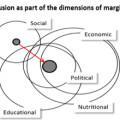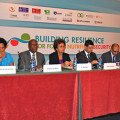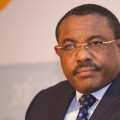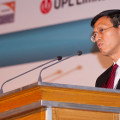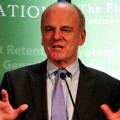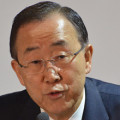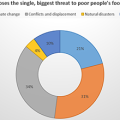A new conference brief by Joachim von Braun and Sukhadeo Thorat makes the case that overcoming exclusion is a complex political agenda with legal, cultural, social, economic, technological, and governance dimensions. Exclusion is a global phenomenon, not just one of developing countries, the authors note, and is fundamentally a human rights issue. Exclusion quite often erodes the resilience capacity of social groups. It brings about unequal access to public services, making excluded people’s efforts to overcome shocks more difficult than those of their counterparts from nonexcluded groups. Moreover, resilience and exclusion are in a vicious dynamic relationship over time. Typically, social exclusion perpetuates the effects of shocks and thereby undermines resilience. The socially excluded groups may collapse or converge to a worse-off steady state after disruptions, taking a protracted time to recover from shocks.
Archives for May 2014
Pacific and Caribbean voices echo at global resilience conference
A delegation of private sector, civil agencies and government sector actors from Asia and the Pacific took the stage at an opening side event at the IFPRI organized conference on "Building Resilience for Food and Nutrition Security." To a person, the panelists expressed a strong wish to have their voices heard loud and wide.
The session titled "Enhancing Resilience for Food and Nutrition Security in Small-islands Economies" was organized by the Technical Centre of Rural and Agricultural Co-operation (CTA) and aimed to outline the unique challenges faced by small-island developing states (SIDS) throughout the region in addition to opportunities for enhancing resilience throughout the region.
Their representation was a welcome addition to the latest addition of the IFPRI 2020 Conference series, the sixth of its kind.
“Each of the conferences builds on including more actors,” says Rajul Pandya-Lorch, Head of IFPRI's 2020 Vision and lead organizer behind the conference. “We saw that with the South Asia conference where this time when we announced this conference, we got an immediate phone call from South Asia with an organization wanting to run a side event.
“That’s why CTA with their experience and networks are so important. And we would hope to amplify that participation at the next conference.”
Building a green and resilient economy in Ethiopia
“For us, anticipating, adapting to, and recovering from shocks are essential to our future.” With those words, H. E. Hailemariam Dessalegn, Prime Minister of Ethiopia, highlighted the importance of resilience for his country. In his inaugural address at the opening of the 2020 Conference on “Building Resilience for Food and Nutrition Security” Thursday evening, >> Read more
Strengthened resilience can help end hunger
Shocks, whether man-made or natural in origin, are a fact of life for citizens of both the developed and developing world. Building resilience in the face of growing threats such as extreme weather events, rising and highly volatile food prices, and the effects of global climate change is more important than ever. If we are >> Read more
Video remarks from Rajiv Shah, Administrator, United States Agency For International Development (USAID)
Video remarks from David Nabarro, United Nations Secretary General Special Representative on Food Security and Nutrition
Video remarks from United Nations Secretary General, Ban Ki-moon
Video remarks from H.E. John Kufuor, Former President, Republic of Ghana
Knowledge Fair Participant Poll: Day 1 Results
1. Which of these shocks poses the single, biggest threat to poor people's food and nutrition security? 2. Is there a difference between resilience and vulnerability?
Day One in Photos

